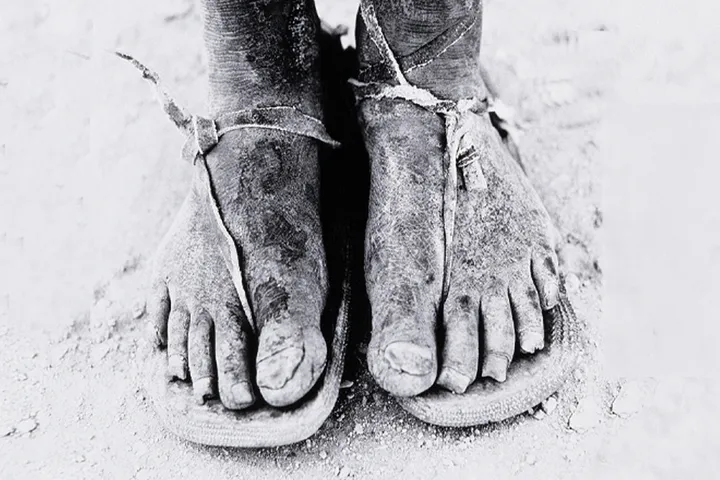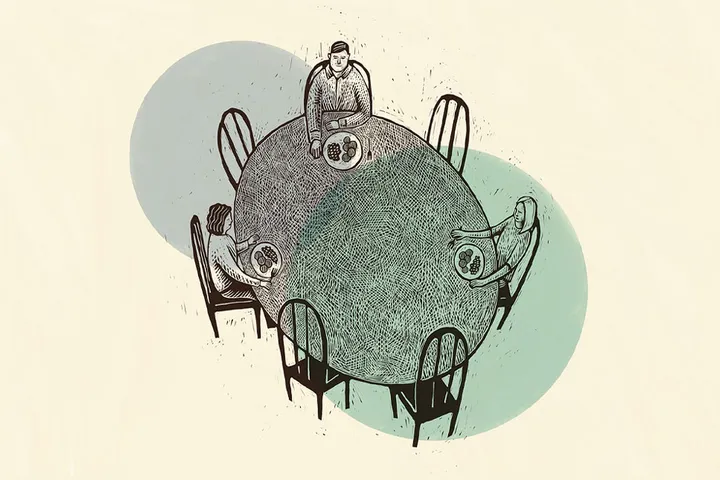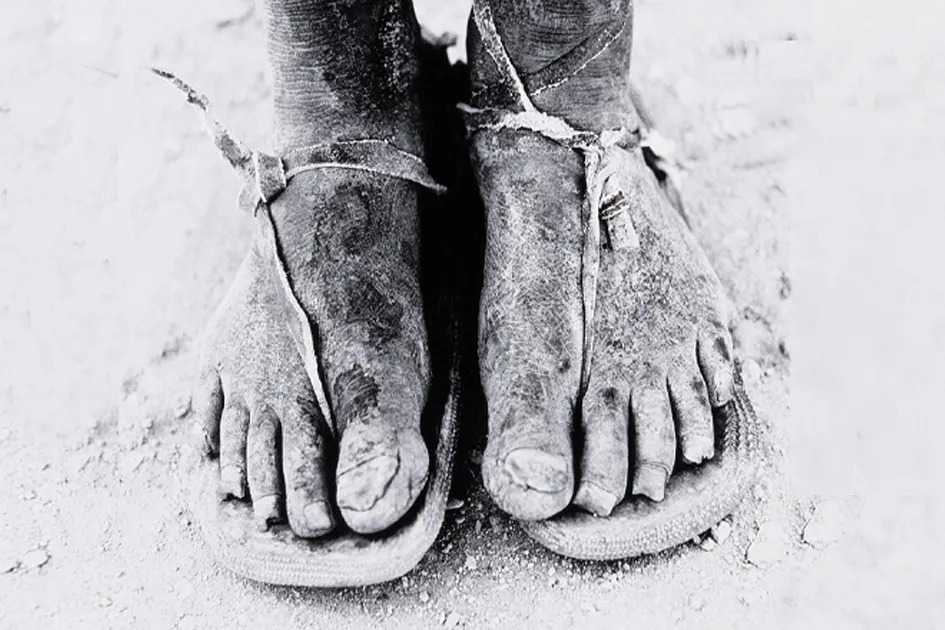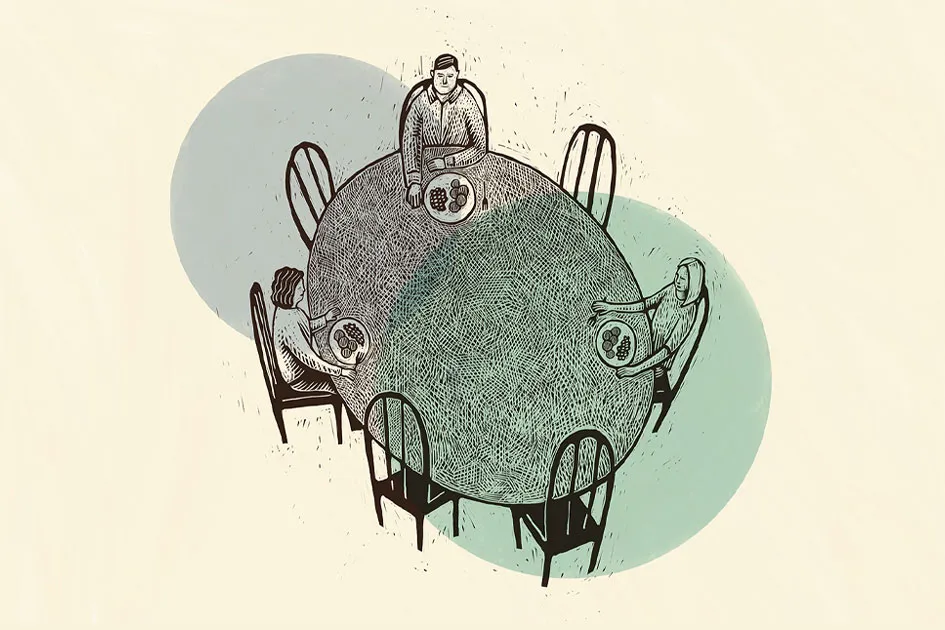Editor’s note: Each month, In Touch staff members respond to an excerpt from Dr. Stanley’s teachings. For this round, C. Lawrence, Joseph E. Miller, and Renee Oglesby discuss what it means to pursue wholeness.
The modern world has mastered the practice of compartmentalization, whether it’s separating work from home or body from spirit. But Jesus never saw it that way. He sees our whole being, made up of many deeply intertwined threads—the many facets of who we are. What does it mean to be “made whole,” and how can we begin to treat ourselves as the fully integrated beings God created? This month’s excerpt comes from Dr. Stanley’s book How to Reach Your Full Potential for God:
The person who has the mind of Christ perceives and thinks in terms of wholeness. Jesus did not heal specific ailments without regard to the rest of a person’s life. Certainly He cured blindness, lameness, leprosy, and many other conditions, but He did so in a way that allowed a person to become truly whole. The Jewish concept of man at that time was much more integrated than our current concept.
Jesus did not heal specific ailments without regard to the rest of a person’s life. He healed in a way that allowed a person to become truly whole.
Today, people routinely talk about the mind, emotions, body, and spirit as if they are four neatly divided and easily charted categories of an individual. We also tend to subdivide each of these areas so that we talk about bodily functions, attributes, and systems as if they are not connected to every other aspect of a person’s physical being. We think that a physician is on the cutting edge of healthcare if she makes a connection between a person’s thinking and his ailment …
Jesus healed people in a way that not only removed the symptoms from their bodies, but it also set them on a path of thinking straight! He told the sick time and again that they had been “made whole” (Matt. 9:22; Luke 8:50; John 5:14 KJV). Jesus also told those He healed, “Sin no more” (John 5:14, John 8:11)—which meant that He wanted them to change their attitudes, their thoughts, and their mental approach to life, in addition to their physical behavior. 
C. Lawrence: One of the things that interests me most about this excerpt is the idea that ancient people had a more integrated approach to being human than many of us today do. We have this perspective that, as modern people, we represent the pinnacle of human existence—our medicine and technology make life so much more comfortable, we live longer, etc. But what about our concept of personhood? Of wholeness?
Renee Oglesby: Integrated is such a descriptive word—all parts of ourselves, personality, emotions, spirit, soul, body—seen as working together. We tend to be far more compartmentalized in how we think of ourselves, don’t you think?
Joseph E. Miller: That makes me think about the exhortation at the beginning of James to have faith, unlike “a double-minded man, unstable in all his ways” (James 1:8).
Kayla: It's interesting to think of compartmentalizing, or dividing our lives, as a way of being “double-minded.” What do you think contributes to compartmentalization in your own life?
Renee: I wonder if we think of it as an easier way to live? I focus on only one thing at a time and whatever that one thing needs—nurturing or fixing—without worrying about how that thing affects all the others.
Joseph: Also, it’s easier to sell someone “a solution” to a singular problem. We think we’re more complex, more learned (to the earlier point) than those who came before us.
Kayla: Do you think compartmentalization somehow feels more safe?
Joseph: Sure, because then you have the illusion of control.
C.: I wonder how much of it is conscious, though.
People in ancient times had a more integrated approach to being human than many of us today do.
Joseph: For example, I want to think my spiritual life is doing great, even if I’m not working out or getting enough sleep. But that’s not the case.
Renee: Do you think earlier civilizations had a completely different view of what it meant to be safe?
Joseph: Yes, Renee. What security had they, really? I mean people have always been scrambling for security, particularly through wealth, which is probably why Jesus pointed out how the Father even feeds birds and clothes the flowers of the field.
Renee: It’s an indicator of privilege that when I hear “safe,” I don’t even think about money, but emotional safety.
Kayla: It almost seems that the risk with embracing wholeness is, if one part of our life is falling apart, then everything is falling apart.
Renee: That’s a frightening concept.
Joseph: Better to look put together, right? We could get into the performance aspect of modern-day evangelicalism and its immediate ties to the life of the Pharisees, but … digression.
C.: But if we’re living in a state of wholeness, do we really see parts? An integrated life suggests that everything is inextricably connected.
Joseph: Honestly, that just makes me more hopeful that when the Lord is doing something in one area of my current existence, all of it is affected.
C.: The thing I’m sitting here trying to contend with is why, if I’m being honest, my life feels compartmentalized at times. And the truth is that most of life is pretty integrated between work and family life, friendships and creative pursuits. It’s my life in the church, my spiritual practices, that so often feel removed. And if I’m being really honest, I think the reason all too often is, that’s how I’ve preferred to live. Maybe the risk is in letting Christ fully enter into every part of my life in His fullness.
Most of life is pretty integrated between work and family life, friendships and creative pursuits. It’s my life in the church, my spiritual practices, that so often feel removed.
Joseph: I don’t want the Lord to have everything, because I’m terrified of giving up control.
What would be left of “me”?
I think He would say, “Well, silly, the real you.” But still, I find it terrifying.
C.: Maybe we’re afraid of becoming our true selves, because it means that the false self needs to die.
Renee: False selves depend on where I am, who I am with: This is work-me. This is home-me. This is church-me.
C.: And we’ve known that false self for a long time—he/she has gotten us through a lot of seasons of life. I think a lot about Colossians 3:3: “For you have died, and your life is hidden with Christ in God.” I think that life is the true life, the true self.
Joseph: I need to reflect on that scripture more: life versus death. Getting back to the work Jesus was doing, it’s not as if He could give people just a little bit of life.
Renee: “Hidden with Christ in God” should be our sense of security, rather than the control we exert on ourselves.
Joseph: Only He can keep me secure.
Kayla: So, C., you're saying maybe the pursuit of wholeness is really about a false self versus a true self?
C.: It’s got to be at least part of it, Kayla. It doesn’t help that we live in an individualistic society, where there’s a tendency to believe we alone have the authority to determine who we are—apart from God and community.
Joseph: It puts a lot of pressure on us when, instead of leaning into God, we think we’re fully in control of our existence—that it’s somehow our right or destiny.
Kayla: Dr. Stanley wrote, “Certainly [Jesus] cured blindness, lameness, leprosy, and many other conditions, but He did so in a way that allowed a person to become truly whole.” What else do you think became whole when Jesus cured physical ailments?
Jesus healed the soul and in a way, I think, healed the internal spiritual division caused by sin within the people He touched.
Joseph: Let’s hope healed people understood that God actually loves them and is a personal God; that He is not distant or ignorant of their suffering, that He doesn’t hear only the really spiritual people.
Renee: The problem of seeing the world from the perspective of a physical struggle got healed.
C.: Well, Jesus could have simply healed the body and left it at that. It would have been profound and impressive, but He did something more. He healed the soul and in a way, I think, healed the internal spiritual division caused by sin within the people He touched. And that leads to freedom, peace, and simplicity.
Kayla: I love that by making people whole, Jesus is essentially saying all these parts that we divide ourselves into are equally important. It actually makes me think of the Sabbath—why is that one of the Ten Commandments? It’s because our bodies are part of our whole being. (The Sabbath is more than just physical rest, but you know what I mean.)
Renee: Because physical tiredness also means emotional, spiritual tiredness.
C.: The Sabbath is a way of ordering things toward wholeness. And if you think about it, that time of rest is really about prioritizing our connection with God and other people.
Kayla: And according to Dr. Stanley, that's how we develop the mind of Christ.
Joseph: I guess to that point, “becoming more like Christ” is going to mean “more whole.” He sure wasn’t divided.
C.: I can’t help but think about how much of what we struggle through is a way of trying to grasp for wholeness through our machinations—the kind of scheming we do to set things right, or set up our lives in a certain way, according to our own goals or desires.
Joseph: Especially if we feel unwhole in a moment, like waiting for healing or for an answer to prayer.
“Do you want to get well?”
C.: It feels like trying to grab these different pieces and make them work together, rather than working from the inside out, with God leading the way.
Joseph: I think “Lord, make me whole” sounds like a good new prayer.
C.: Yes, though it brings to mind Jesus’ question to the man sitting by the pool of Bethesda. Jesus asks, “Do you want to get well?” (John 5:6). That gets back to our earlier question of whether or not we’re willing to let Him in.
Joseph: Most of us want to answer, “Um, just a little?” or “OK, but at what cost?”
Renee: And, “Help me to understand what wholeness can look like, what it will accomplish, in my life.” The question “Do you want to get well?” is super scary to me.
C.: I have to be honest and say a lot of the time the answer is, “No, Lord.” Like Augustine’s prayer, “Lord, give me chastity—but not yet.” I want that simple, faithful life. The integrated experience of God flowing through every interaction, every hour, all the time. And yet, I want it on my terms. When I somehow will decide it’s time.
Renee: The pursuit of wholeness is sure to reveal some wrong priorities on my part.
C.: Or even a wrong orientation toward life.
Renee: What does do you mean by that, C.?
C.: It could be that the whole framework we see life through is wrong, and mixed-up priorities are just a symptom of that. If we’re looking through the wrong lens, everything is skewed. What are we letting define our vision? Whose parameters are we living by?
Renee: Possibly unrelated, but do you think this may be why we have such a hard time grasping the Trinity?
Joseph: Very much so.
What would happen if we viewed everything we do through that lens of the Trinity’s unceasing and self-emptying love?
C.: I really like that you brought up the Trinity, Renee, because the Godhead is the ultimate lens on the world. All reality flows from Father, Son, and Holy Spirit in perfect communion with one another.
What would happen if we viewed everything we do through that lens of the Trinity’s unceasing and self-emptying love?
Renee: More of Him and less of me, in all things.
C.: And not just what we do, but who we are? Who you are, your neighbors and family and friends … I think we’d find ourselves on that path to wholeness. And maybe it would become a lot clearer what’s thwarting our ability to grow in that direction, when held up against that image of true and total Love.
I don’t think we can say what that looks like for each person—in the end, we’re all unique, free, and unrepeatable beings.
Renee: For some, an image of true and total Love is a foreign concept. Something the Spirit must reveal.
C.: That’s what makes me think we find that path to wholeness by working from the inside out—our communion with God flows out to all other aspects of our life, and brings it all together.
Prayer, repentance, humility, giving up our life day by day. It’s a lot—and we have to want it. Maybe the most important prayer is “Lord, help me to want it.”





